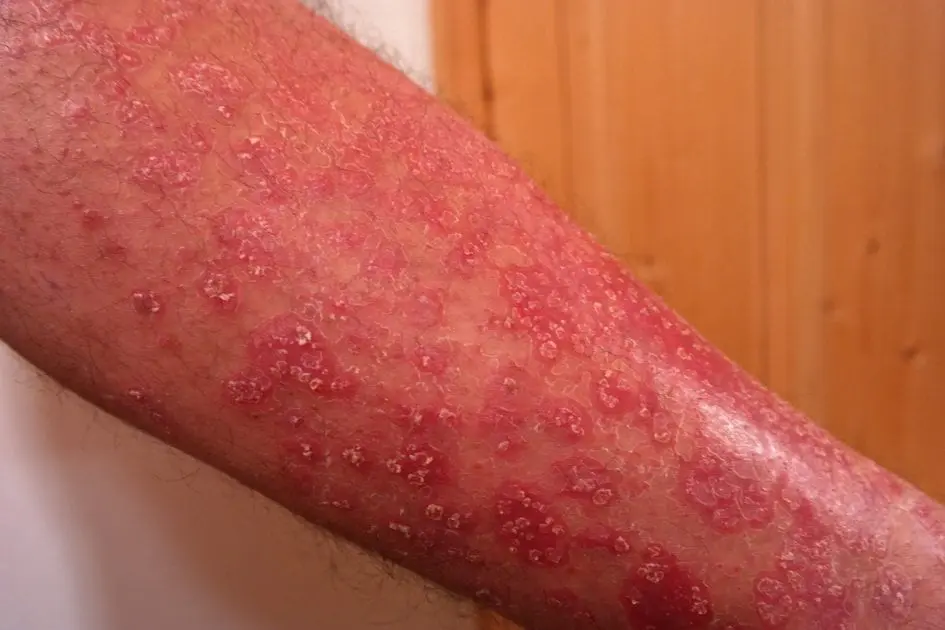Psoriasis often presents itself after contracting strep throat or getting a serious sunburn or even a scratch or cut. Scientists believe if you have a psoriasis episode after such a trigger, it all likely started with genes and a predisposition to the disease. Imagine looking down and seeing red patches on your knees that are incredibly itchy after getting strep throat. Immediately, you try and stop the itch and put on some long pants. You wonder if maybe you are having an allergic reaction to an antibiotic or other medication. Which doctor should you see? Should I cancel all my plans? Should you go to a primary care doctor or a skin doctor?

Other questions arise in your head.
Am I contagious? Will I possibly infect my family?
Will over-the-counter medicines work?
What will people think when they see these lesions?
Will they go away on their own?
I may be pregnant. Will my child inherit psoriasis?
Ultimately, you will be referred to a dermatologist if you do in fact have psoriasis. There is no real test for the disease, yet dermatologists are trained to identify it. If you are diagnosed with psoriasis, your dermatologist will share treatment plan options. Psoriasis can often be controlled with treatment and by being aware and avoiding triggers. You are not alone. The National Psoriasis Foundation estimates eight million people in North America have psoriasis. As for you passing on psoriasis to your children, yes you will likely pass the genes to your child. The child may or may not ever show signs of psoriasis.
Do take it seriously as other health conditions could result such as cardiovascular disease or depression.
What is Psoriasis?
Psoriasis is an auto-immune (immune-mediated) chronic skin disease in which red raised scaly patches appear on the skin. Psoriasis shows up in different forms and severity levels. It may be itchy and sting or burn. There are different types of psoriasis. Some show up on the skin as small red spots or pus-filled red bumps.
The most prominent form of psoriasis is:
Plaque psoriasis
With plaque psoriasis, patients develop thick red patches and some white scaly skin appearance, also referred to as lesions. These lesions can develop anywhere over the body, but the most typical appearance of lesions is over scalp, knees, elbows, or lower back area. The raised red patches can crack and bleed.
According to an estimate, more than 7.5 million population in the United States is suffering from this skin condition.
Is Psoriasis Contagious?
Psoriasis shows up as an auto-immune reaction on the surface of the skin. You cannot get psoriasis from coming into contact with someone with the disease. That includes skin to skin contact or a swimming in the same water.
Causes on Psoriasis: Research
According to AAD (American Academy of Dermatology), WebMD, and the National Psoriasis Foundation, psoriasis is not contagious. Instead, it is an auto-immune disorder in which specific human genes are responsible for the development of the disease. Just because you have the genes associated psoriasis does not always mean that you will develop the disease. Still, some environmental triggers can also cause or exacerbate psoriasis, which is as follows:
- Reactions to drugs or medicines
- Erosional stresses
- Cold weather
- Skin injuries and infections
- Excessive alcohol consumption
The severity of psoriasis:
Psoriasis is usually measured in terms of the emotional and physical impact it causes.
Psoriasis has following severities:
- Mild – less than 2% of the body is affected
- Moderate – 3 to 10% of the body is affected
- Severe –more than 10% of the body is affected
In these categories, the percentage is measured as the palm of the hand representing one percent.
The severity of psoriasis is also tied to how it impacts one’s quality of life. If psoriasis encroaches to extremities like hands and feet, then its intensity is considered as severe because, in these cases, it can affect daily life functions.
Treatment Plans
Your dermatologist will recommend treatment based on the type and severity of the disease. Treatment can be challenging, as it is a chronic condition with unpredictable flare-ups.
See Suncoast Skin Solutions treatment plans
Colleen Ursic, PA-C is a member of the National Psoriasis Foundation and works out of our Daytona Beach office. Suncoast Skin Solutions is Florida’s “Most Trusted” Dermatology. Each of our locations has a dermatologist on site to evaluate psoriasis and offer treatment options.
Call us to help you locate an experienced dermatologist near your area of Florida.

Recent Comments